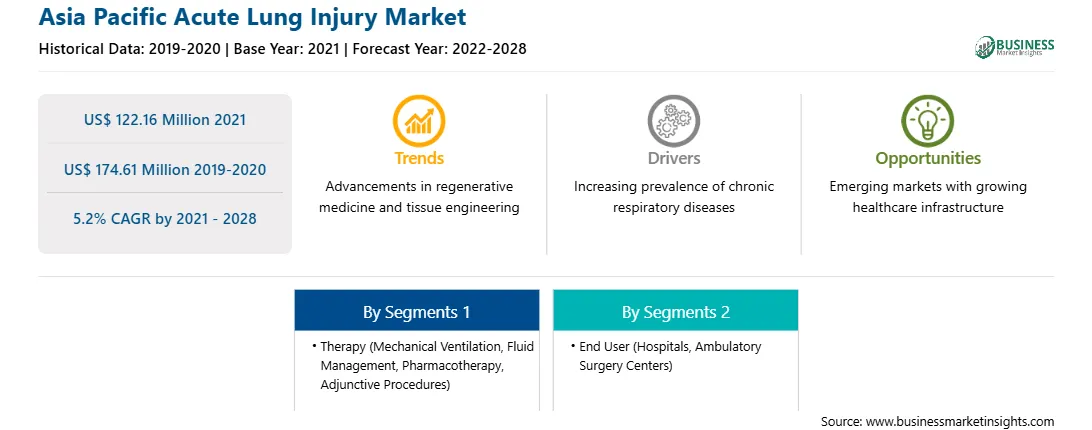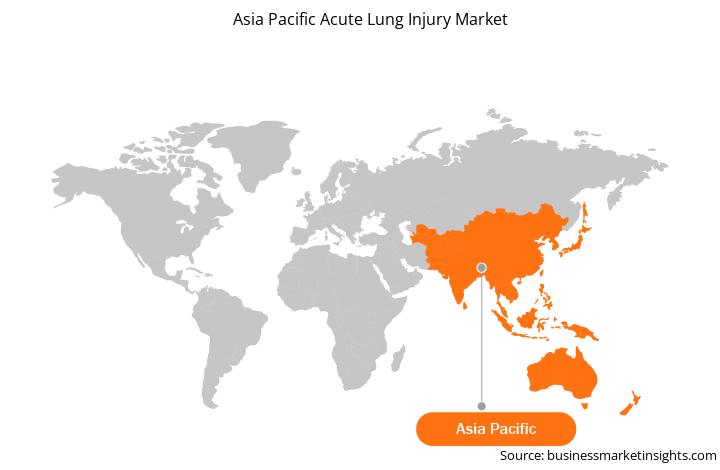APAC Acute Lung Injury market is analyzed based countries such as China, Japan, India, Australia, South Korea, and the rest of APAC. China held the largest share of the market in 2021. The growth of the market in the country is attributed to the higher prevalence of respiratory and other various other lung diseases. China is among the most populated countries in the world, and it is a country with a maximum number of patients living with respiratory disorders. The country also has experienced a significant rise in the elderly population; therefore, lung-associated diseases are the leading causes of death among older people. According to a recent study- “Chronic Illness and Ageing in China”, China's population is aging, and chronic illnesses are increasingly prevalent. From 2010 to 2040, it is predicted that the proportion of people aged 60 years plus in China will rise from 12.4% (168 million) to 28% (402 Million). Approximately 80% of deaths in China in people aged 60 years are from chronic Non-Communicable Diseases (NCDs); the most prevalent diseases are Ischemic Heart Disease, Chronic Obstructive Pulmonary Disease (COPD), Stroke, and Type 2 Diabetes. Behavioral risks including smoking, sedentary behavior, alcohol consumption, and poor dietary intake contribute significantly to these conditions. Given that chronic diseases in the region are gradually elevating, need for advance treatment is propelling in China. This factor has offered a significant boost to the adoption of acute lung injury therapies. Thus, the collective impact of the above-mentioned factors is expected to augment the growth of the market in region.
In case of COVID-19, APAC is highly affected specially India. As of September 2021, the COVID-19 cases reached 56.5 million in APAC, according to the United Nations Office for the Coordination of Humanitarian Affairs (UNOCHA). COVID-19 infection has been a serious problem in the patients with acute lung injury. According to the clinical data of infected patients in Asia, radiologic evidence of lung edema is common and deserves clinical attention. Lung edema is a manifestation of acute lung injury (ALI) and may progress to hypoxemia and potentially acute respiratory distress syndrome (ARDS). Patients diagnosed with ARDS and ALI have poorer prognosis and potentially higher mortality. Although no effective treatment is formally approved for COVID-19 infection, support of ventilation with oxygen therapy and sometimes mechanical ventilation is often required. Treatment with systemic and/or local glucocorticoids might be helpful to alleviate the pulmonary inflammation and edema, which may decrease the development and/or consequences of ARDS. For instance, a study combining data from China and Italy indicated that 27% of highly infected COVID-19 patients required assisted ventilation and had a 21% death rate. As a result, the acute lung injury market in the region has seen great expansion due to the COVID-19 impact.

Strategic insights for the Asia Pacific Acute Lung Injury provides data-driven analysis of the industry landscape, including current trends, key players, and regional nuances. These insights offer actionable recommendations, enabling readers to differentiate themselves from competitors by identifying untapped segments or developing unique value propositions. Leveraging data analytics, these insights help industry players anticipate the market shifts, whether investors, manufacturers, or other stakeholders. A future-oriented perspective is essential, helping stakeholders anticipate market shifts and position themselves for long-term success in this dynamic region. Ultimately, effective strategic insights empower readers to make informed decisions that drive profitability and achieve their business objectives within the market.

| Report Attribute | Details |
|---|---|
| Market size in 2021 | US$ 122.16 Million |
| Market Size by 2028 | US$ 174.61 Million |
| CAGR (2021 - 2028) | 5.2% |
| Historical Data | 2019-2020 |
| Forecast period | 2022-2028 |
| Segments Covered |
By Therapy
|
| Regions and Countries Covered | Asia-Pacific
|
| Market leaders and key company profiles |
|
The geographic scope of the Asia Pacific Acute Lung Injury refers to the specific areas in which a business operates and competes. Understanding local distinctions, such as diverse consumer preferences (e.g., demand for specific plug types or battery backup durations), varying economic conditions, and regulatory environments, is crucial for tailoring strategies to specific markets. Businesses can expand their reach by identifying underserved areas or adapting their offerings to meet local demands. A clear market focus allows for more effective resource allocation, targeted marketing campaigns, and better positioning against local competitors, ultimately driving growth in those targeted areas.

The APAC acute lung injury market is expected to grow from US$ 122.16 million in 2021 to US$ 174.61 million by 2028; it is estimated to grow at a CAGR of 5.2% from 2021 to 2028. The high prevalence of respiratory conditions is associated with the decrease in the size of the upper airway lumen in the aging population. Lung disorders are among the most common medical conditions across the region. People suffer from various sorts of respiratory diseases. Smoking, infections, and genetic factors are among the common factors responsible for respiratory disorders. Medical conditions such as COPD, asthma, chronic bronchitis, cystic fibrosis, and lung cancer are significant public health burdens. In addition, the World Health Organization (WHO) states that millions of people die from lung cancer every year, making it the most common lethal infectious disease. In addition, 91% of the population lives in cities and places where the air quality is not optimum, as recommended by the WHO. Patients suffering from these respiratory disorders commonly experience difficulty in breathing. The respiratory failure associated with acute lung injury, or the acute respiratory distress syndrome (ARDS) is one of the most critical contributors to postoperative mortality. Moreover, state, and local health departments, and other clinical and public health associates continue to monitor smoking e-cigarette or vaping product use associated lung injury (EVALI). Thus, all the above-mentioned factors are expected to result in the growth of the APAC acute lung injury market during the forecast period.
In terms of therapy, the mechanical ventilation segment accounted for the largest share of the APAC acute lung injury market in 2020. In terms of end user, the hospitals segment held a larger market share of the APAC acute lung injury market in 2020.
A few major primary and secondary sources referred to for preparing this report on the APAC acute lung injury market are company websites, annual reports, financial reports, national government documents, and statistical database, among others. Major companies listed in the report are Angion; GlaxoSmithKline Plc; ReAlta Life Sciences, Inc.; Stemedica Cell Technologies, Inc; and Windtree Therapeutics, Inc.
The Asia Pacific Acute Lung Injury Market is valued at US$ 122.16 Million in 2021, it is projected to reach US$ 174.61 Million by 2028.
As per our report Asia Pacific Acute Lung Injury Market, the market size is valued at US$ 122.16 Million in 2021, projecting it to reach US$ 174.61 Million by 2028. This translates to a CAGR of approximately 5.2% during the forecast period.
The Asia Pacific Acute Lung Injury Market report typically cover these key segments-
The historic period, base year, and forecast period can vary slightly depending on the specific market research report. However, for the Asia Pacific Acute Lung Injury Market report:
The Asia Pacific Acute Lung Injury Market is populated by several key players, each contributing to its growth and innovation. Some of the major players include:
The Asia Pacific Acute Lung Injury Market report is valuable for diverse stakeholders, including:
Essentially, anyone involved in or considering involvement in the Asia Pacific Acute Lung Injury Market value chain can benefit from the information contained in a comprehensive market report.